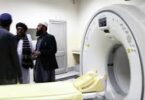KABUL (Tolo News): Gen. Frank McKenzie, the commander of US Central Command said he will make recommendations to US Defense Secretary Lloyd Austin in early June on how to monitor and fight “terrorist groups” in Afghanistan from beyond its borders after troops withdrawal, AP reported.
Gen. McKenzie said negotiations with Afghanistan’s neighbors for overflight rights and troop basing are “moving forward” but will take time, the report said. As a result, he said, the way the United States keeps an eye on the terrorist threat and aids the Afghan military will evolve as agreements are reached or security conditions on the ground change.
He cautioned that this will be a “taxing time” for the Afghan military and “the risk is high.” Speaking to reporters from The Associated Press and ABC News traveling with him to the Middle East, McKenzie declined to provide details about the recommendations he will make to Austin. He said he will also provide cost estimates for keeping surveillance aircraft over Afghanistan regularly enough to keep track of terrorist groups after the US pullout is completed no later than Sept. 11.
McKenzie has made it clear that without any bases in neighboring countries, it will require far more aircraft to keep watch over Afghanistan because they will have to fly for four hours to six hours from other US military installations in the Middle East. The flight distance severely limits the amount of time the aircraft can spend in the air over Afghanistan.
This comes as eleven members of the US House of Representatives–10 Democrats and one Republican–wrote a letter to President Joe Biden on the “enduring interests and ideals that should continue to guide US efforts in Afghanistan even as the armed forces end their mission in the country” amid the start of the withdrawal of American troops from the country. The letter was signed by US Reps. Tom Malinowski (D), Jim Langevin (D), Mike Waltz (R), Stephanie Murphy (D), William R. Keating (D), Chrissy Houlahan (D), Colin Allred (D), Dean Phillips (D), David Cicilline (D), Gerald E. Connolly (D) and Bill Foster (D).
The withdrawal of the US military, which began on May 1 and is scheduled to continue until Sept. 11, 2021, has raised concerns over the future of Afghanistan, especially gains achieved in women’s rights, girls’ education and the growth of civil society, which includes a free media. The lawmakers said they hope President Biden will continue to make clear that “America’s policy in Afghanistan is to ensure the survival and success of that government and of the Afghan National Defense and Security Forces and to stand by those Afghans who bet their lives on the future the US promised them.”
They mentioned that the capabilities of Afghanistan’s security forces will determine whether the Taliban succeeds in “reimposing medieval rule over Afghanistan’s 40 million people; whether al-Qaeda and Daesh reestablish terrorist sanctuary there; and whether the country once again unravels in civil war.” The peace process, meanwhile, has moved forward haltingly, especially after President Biden announced the full withdrawal of US forces by Sept. 11. The Taliban has recently expressed their intentions to resume the talks, but their unwillingness to participate at a UN-led conference in Turkey has delayed the event multiple times since April.
The lawmakers, pointing to the abilities of the Afghan National Defense and Security Forces, said if there is any prospect of a just, peaceful settlement in Afghanistan, it will happen “only after the Afghan military demonstrates to the Taliban that their insurgency will not triumph on the battlefield.” The congress members reiterated that the United States needs a strategy to sustain its Afghan military partners after the full withdrawal of American troops from the country.
Violence has remained high in Afghanistan despite a three-day ceasefire from May 12 to May 15. A day after the ceasefire ended, security agencies reported clashes between government forces and the Taliban in 18 provinces. The lawmakers said that Afghans have long borne the overwhelming brunt of the counterterrorism fight in their country and that they remain heavily dependent on US and international enablers, including intelligence, surveillance and reconnaissance assets and maintenance and repair for their equipment.
Meanwhile, the lawmakers said that they will support generous US funding for Afghanistan’s civil society and for its social and economic development. But international assistance will only help if there is security for the Afghan people and proper on-the-ground oversight of that aid, they said. They added that if security deteriorates, those Afghans most at risk may need to find safety elsewhere.
This comes as US special envoy Zalmay Khalilzad said that the prediction that the Taliban will quickly overrun Afghan forces and conquer Kabul after full US withdrawal is unduly pessimistic. “I personally believe that the statements that their forces will disintegrate and the Talibs will take over in short order are mistaken,” Khalilzad told the House Foreign Affairs Committee.
Khalilzad said that the Afghan government and the Taliban should do their part in the peace process. He stressed the need for Pakistan’s role in the peace efforts in Afghanistan. On May 17, President Ashraf Ghani said that the Afghan government is ready to fight against the Taliban after the full withdrawal of international troops from the country, reiterating that the key to peace talks is to accept the election as a way forward for Afghanistan’s future government.






